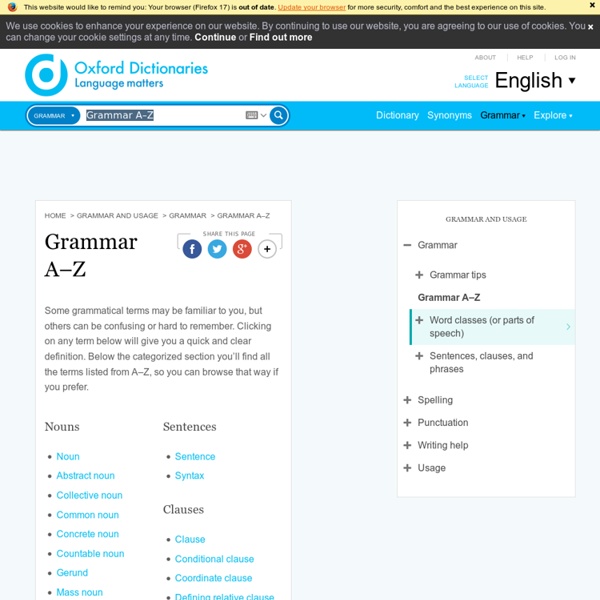English grammar: A complete guide
Do you have a question about the correct usage of the semi-colon or how to place relative adverbs in a sentence? If so, you've come to the right place! The edufind.com English grammar guide is a complete reference on the rules of English usage. Every grammatical rule is explained in clear, simple language with several examples and, when necessary, counter-examples. The grammatical rules covered by this guide are categorized by part of speech. Comparisons Conditional Future Gerund and Present Participle Infinitive Passive Voice Past Present Functions and classes of determiners Articles Quantifiers Distributives
Grammar
Nouns What are Nouns - Definition, Noun Examples, Formation of plural nouns, The Functions of nouns in sentences, The Types of nouns Abstract vs Concrete Nouns Definition, Examples, Quiz. Identify if noun is Concrete or Abstract. Proper vs Common Nouns Definition, Examples, Quiz. Countable vs Uncountable Nouns Definition, Examples, Quiz. Collective Nouns Definition, Examples, Quiz. Gerunds and Present Participles Definition, Examples, Quiz. Noun as Subject of a Sentence Definition, Examples, Quiz. Noun as Subject Complement Definition, Examples, Quiz. Noun as Direct Object Definition, Examples, Quiz. Noun as Object Complement Definition, Examples, Quiz. Noun as Indirect Object Definition, Examples, Quiz. Noun as Appositive Definition, Examples, Quiz. Noun as Object of the Preposition Definition, Examples, Quiz. Irregular Nouns List Irregular Nouns Spelling Test Pronouns English Pronouns List Alphabetical list of English pronouns with definitions and translations. Verbs Practice.
7 Great Grammar Sites for Teachers and Students
June , 2014 Today I am sharing with you a list of some useful websites you can use with your students to help them better improve their grammar knowledge and polish their writing skill. From grammar lessons and teaching materials to free downloadable worksheets and presentations, this collection of websites will provide you with the content you need for teaching grammar. 1- Grammar Bytes Grammar Bytes is a great website that is packed full of teaching materials teachers can use to teach grammar.Grammar Bytes provides a glossary of common terms, fun interactive activities and exercises for students to test their grammar knowledge,instructional presentations and tons of tips on teaching grammar. 2- Road to Grammar Road to Grammar is a free website that provides a wide vareity of resources for teaching grammar. 3- Grammar Gold Grammar Gold provides grammar practice for grades 1 to 5.You can click on any of the grades to access the grammar lessons it features. 4- Grammar Snack
English Grammar: a complete guide
Do you have a question about the correct usage of the semicolon or how to place adverbs in a sentence? If so, you've come to the right place. These pages are a complete English grammar guide filled with the rules of English usage. Each grammatical rule is explained in plain English with several examples, and when needed, counter-examples. The grammatical rules covered by this guide are categorized below. English grammar is not always easy to understand, but by using this guide you should be able to remind yourself of the rules of English usage and speak or write English with confidence. Nouns Nouns are people, places, or things, They tell us what we are talking about. Adjectives Adjectives modify, or describe, nouns. Adverbs Adverbs modify adjectives, verbs, or other adverbs. Determiners Articles, quantifiers, and other determiners modify nouns. Verbs & Verb Tenses Verbs are action words. Speech When we report what someone says, we can cite the person directly or indirectly. Punctuation
English Speaking and conversation practice and activities for ESL students and teachers
ESLgold.com provides thousands of free resources and information for both students and teachers. All materials are organized by skill level for quick and easy access, Just click on a link to get started. ESL Students learn how to use greetings in English in this ESLgold.com video. ESLgold.com is the world's largest collection of ESL learning resources including, games, videos, lessons, worksheets and quizzes. Visit us today at www.ESLgold.com.
Grammar worksheets
Grammatical worksheets When you click on the blue links, the first page you will usually see will be a page with exercises. After you've tried doing these, click on the link to the worksheet at the bottom of the page and you will find Viv's explanations on this area of the English language. Worksheets suitable for beginner, elementary & pre-intermediate students. 'To be' worksheet- Beginner Questions + verb 'to be' worksheet? Gerund or infinitive? 'Have' worksheet- Pre-intermediate Worksheets suitable for intermediate students. Comparatives, superlatives and in/equality Gerund or infinitive? 'Have' worksheet- Intermediate Indirect speech The narrative tenses 1 Stative verbs 1 When do I use the perfect tenses? Worksheets suitable for upper-intermediate and advanced students. The English tense system Future tenses Gerund or infinitive? 'Have' worksheet- Upper-intermediate + Indirect and reported speech Linking words Modal verbs Possessive 's' Question formation in English Stative verbs 2 Word order in English
Learn English Conversation
Click Here =► To Start Making Money Online Make Money Online "Make money at home". Make money online. Make Money fast. Click Here =►



